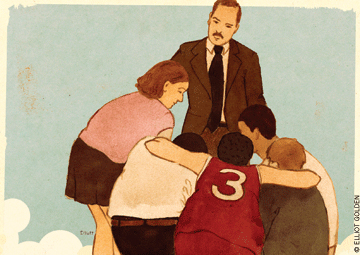
What a non-basketball-playing English major learned from Fran Dunphy.
By Melody Joy Kramer
Fran Dunphy knows my name. This becomes apparent early one morning as we pass each other on Walnut Street. I see the mustache, the ruddy complexion, the leather bomber jacket coming out of Dunkin Donuts before I even have a chance to think. “Hello Coach Dunphy,” I say. “How’s it going?”
“Hey Mel,” he replies. “Not bad.”
I’m midway to the corner when I stop. He just said my name. Fran Dunphy–the winningest coach in Penn’s men’s basketball history and one of the most “respected” coaches in the country, according to ESPN—knows who I am. I feel giddy. I turn back and see him continuing down the street, clutching his cup of coffee and nodding to almost everyone he passes. I’m trying to picture, say, Bobby Knight in a similar situation. For some reason, I can’t.
We had only met two weeks earlier. I had received an email asking if I wanted to participate in a lunch series through the Fox Leadership Program. It was free. Coach Dunphy would be leading a group of students through a three-month leadership-training course. There would be hoagies, the email said. Of course I wanted to participate.
As a member of the Penn Band, I was sure I could hold my own with the sports fanatics in the room. I had certainly attended my fair share of basketball games over the years. I had painted my face red and blue and followed NCAA tourney bids and watched as Coach Dunphy instructed his team from the sidelines. But I had never heard him speak—and I wanted to know what, if anything, he said would be applicable to a non-basketball-playing English major.
As the motley assortment of Whartonites and engineers and biologists and political scientists trickled into the seminar room during our first meeting, Dunphy remarked how happy he was to be back in the classroom. “I just really enjoy this, getting to know the students,” he said. No one in the room had known that Dunphy—on top of coaching—had helped teach a small group-dynamics class in the Wharton MBA program for the past seven semesters. No one knew that Dunphy was also the chairman of Coaches vs. Cancer, an organization that raises money for the American Cancer Society.
As Dunphy told us his methods for running the basketball team week after week, I realized that what he was saying applied to any small group: Learn names. Leadership is more important when someone screws up. It’s important to know how to talk to different types of people. The leader controls the dynamic of the organization. Use your influence to do good in the world.
These were all important lessons, to be sure. But as I watched him talk to us, I began to realize that there was nothing in the Penn Course Review to note how much a player could learn from a coach. This man who was teaching us his path from Southwest Philly and LaSalle to the best coaching record in Ivy League history was with the team for hours a day. The Palestra was his classroom. His players—his students—were receiving four years of Dunphy-life-skills from one of the most dynamic teachers I’ve had at Penn. And his players truly respected him.
Matt Langel W’00, who was a member of Penn’s basketball team and is now an assistant coach, admitted that Dunphy’s “not going to be your best friend while you’re in the process.” Dunphy is a hard coach and he expects his players to work as hard as he does. But now that Matt’s not playing—and is one of Dunphy’s co-workers—he realizes the importance of Dunphy’s methods.
“Dunphy said, ‘I’m going to be on your ass every day, but I’m going to look out for you while you’re here,’” Langel said. “And it’s not just basketball. He uses his influence from basketball to extend outside Penn and help a greater cause.”
This cause includes instructing students who have no affiliation with the basketball team. At our first few classes, we discussed ways to run a team and ways to keep the energy flowing in a stressful environment. Guest lecturers came in—Langel; Wharton senior Eric Osmundsen, the team captain; and Steve Bilsky W’71, the athletic director. The class traveled to the Phillies stadium to visit David Montgomery and learn how a larger organization is run. Dunphy planned to bring in Pat Croce and Dawn Staley later in the semester as examples of savvy leaders on the national level.
Dunphy is extremely well-connected, I realized, as we were being wined and dined in the Phillies executive cafeteria and learning how Montgomery C’68 WG’70 went from a student at Penn to the president of a Major League baseball team. He also realizes that basketball is a simply his medium to channel his energy into something greater for both his players and the community. “My job,” he told us, “is to provide as many memories and experiences [as possible] for our student-athletes to have for the rest of their lifetimes.” He goes out to the court for every game wanting to win–but also realizing that the experience does not end on the court. “We’re trying to win,” he said. “But we’re also trying to make a difference.”
The February 9, 1999, match against Princeton—known as “Black Tuesday” in Penn lore—remains a game that many of Dunphy’s athletes may want to forget. Penn blew a 27-point lead before a sell-out crowd and Dunphy had to go into the locker room after the game to talk to the team. He posed the question to us: “What would you have done?”
We brainstormed. College senior J.T. Stetson suggested using the loss as a motivation for the rest of the season. College sophomore Keandra Dodds would emphasize that the “game’s never over till the final buzzer goes off.” College freshman Aly Blum said, “You can learn from falling down, and you can learn from picking yourself up for the next game.”
Dunphy agreed that the game was a way to teach his players to learn from their mistakes. “Every time something goes wrong, you are now blessed with a great opportunity to make it right,” he said. He looked around the table at us. “If someone said you could take away 10 losses, that would be the last game I would take away, because it was a great learning experience.”
Imagine Bobby Knight pausing mid-chair-throw to say the same thing. Somehow I doubt he would even consider teaching a class to a room full of undergraduates he didn’t know. I’m struggling to picture Knight saying what Coach Dunphy told us during our first meeting: “If there’s something more fun than doing something for others, then I haven’t found it.”
Melody Joy Kramer C’06 won this year’s Nora Magid Mentorship Prize and she was recently named a Kroc Fellow at NPR. Her email address is [email protected].




